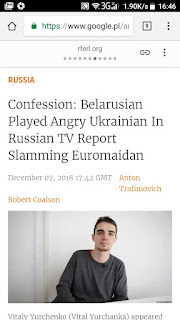Insane Russian desamination of political schizophrenia has no borders/no limits..
MINSK -- A young Belarusian has told RFE/RL that he is "totally ashamed" that he agreed to play the role of a disgruntled Ukrainian in a new report broadcast in November by Russia's state-owned Channel One....
There is hope for this young man, but none for the insane idiots that caused killing spree in Ukraine and Europe...
Lying, deceiving, and killing across the Ukraine and Europe...at home in Russia, institutionalising(placing them on forced unemployment etc.) Russians for having their say and so on...the all new same old same Kremlin's politic....
From Radio Free Europe:
MINSK -- A young Belarusian has told RFE/RL that he is "totally ashamed" that he agreed to play the role of a disgruntled Ukrainian in a new report broadcast in November by Russia's state-owned Channel One.
"This is really shameful and I am totally ashamed that I did this," Vitaly Yurchenko said on December 7, adding that it was a "monstrous mistake."
Yurchenko told RFE/RL's Belarus Service that he played the role because the audio in the original interview, which was purportedly filmed in the Ukrainian city of Kryvyi Rih, was unusable and the submission deadline was looming. The scene was filmed in an apartment in Minsk.
He said that he personally had seen the original interview and that Russia's Channel One was not aware of the deception.
Russian state media generally, and Channel One in particular, have been accused of falsifying purported news reports in the past, including through the use of actors to impersonate locals.
Channel One television on December 7 issued a press release apologizing for the Kryvyy Rih report and saying that the channel had been deceived by "stringers" who prepared the report. The channel added that it would make the original interview public as soon as possible.
The piece, which was broadcast in November for the fifth anniversary of Ukraine's Euromaidan uprising, argued that it had failed to bring any tangible results to Ukraine. It showed Yurchenko posing as a young man identified as Kirill Chubenko from "Ukraine" who complained that he had not benefited personally from the Euromaidan events.
"Euromaidan hasn't given me anything personally," Yurchenko/Chubenko said. "Just look where we ended up. We were supposed to look toward the future but that future turned out to be without heat, with expensive electricity. And who knows how it will all end?"
Channel One apologized to its viewers and said there was no justification for the deception.
Yurchenko was first identified on the video by prominent Russian blogger Ilya Varlamov in a post on December 6. Varlamov said he was tipped off by a reader.
Yurchenko told RFE/RL that after Varlamov's blog post was published, he began receiving threats on social media and decided to come forward with his side of the story.
History Of Fakery
In 2016, the independent website The Insider published an expose about how Russian television hired people in Germany to express antimigrant views for news reports.
The same year, Channel One used footage from a 2016 film set in Syria to bolster a claim by Moscow that a suspected chemical attack in the town of Douma had been "staged."
In 2014, Channel One showed a nearly 20-year-old photograph of a mass grave from Russia's first war with Chechen separatists in the 1990s and described it as one of several "horrifying images" of the war in eastern Ukraine.
In June 2018, the Ukrainian website Stop Fake, which combats Russian disinformation, published a report by Lukas Andriukaitis of the Vilnius Institute for Policy Analysis that collected numerous examples of actors playing "the roles of alleged locals" in Russian news media reports.
"The tactic is very effective and deliberately targeted at Russian-speaking television viewers," Andriukaitis wrote. "Since most of the casual Russian TV viewers are less likely to get their everyday information from different sources...a lot of them never find out that these were professionally staged and manipulated lies."
"In this day and age, when active communities and independent investigators are very active on the Internet," he continued, "it gets increasingly harder for Kremlin-funded media to get away with these scams on a large scale."


No comments:
Post a Comment